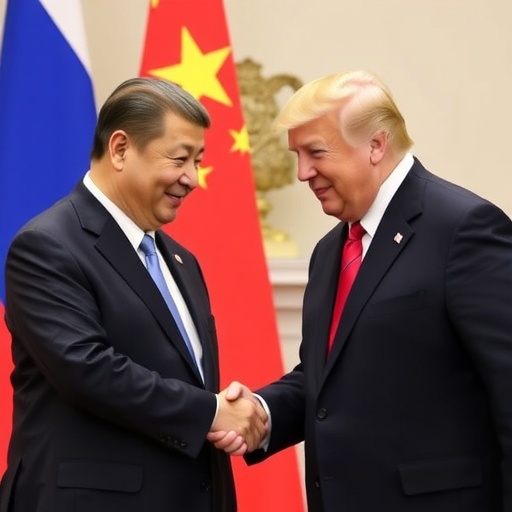Trump and Xi Jinping to Hold High-Stakes Bilateral Meeting in South Korea on Russia and Global Security
In a move that could reshape international alliances, President Donald Trump is scheduled to meet Chinese President Xi Jinping in Busan, South Korea, next Thursday for a pivotal bilateral meeting. The discussions, set against the backdrop of escalating global tensions, are expected to center on Russia’s role in world affairs and broader security challenges, marking a rare diplomatic outreach amid strained US-China relations.
- Busan’s Role as Neutral Ground for Trump-Xi Diplomacy
- Russia’s Invasion Casts Long Shadow Over US-China Bilateral Talks
- Global Security Agenda: From Indo-Pacific Tensions to Cybersecurity Threats
- Economic Undercurrents Shaping Trump-Xi Bilateral Dynamics
- Potential Breakthroughs and Lasting Impacts from the Busan Summit
The announcement, confirmed by White House officials on Wednesday, underscores the urgency of direct dialogue between the two superpowers. As Trump prepares for his second term, this encounter with Xi Jinping highlights a potential thaw in frosty ties, with South Korea serving as a neutral ground to address thorny issues like the Ukraine conflict and Indo-Pacific stability. Sources close to the administration indicate that the bilateral meeting could last up to three hours, focusing on de-escalation strategies without formal agendas leaked to the press.
This development comes at a time when global security threats loom large. Russia’s ongoing invasion of Ukraine has disrupted energy markets and supply chains, affecting both China and the US. With trade volumes between the US and China reaching $690 billion in 2023 according to US Census Bureau data, any misstep in these talks could ripple through economies worldwide. Trump’s approach, known for its directness, contrasts with Xi’s measured diplomacy, setting the stage for a high-stakes exchange that observers say could influence everything from NATO’s eastern flank to the South China Sea.
Busan’s Role as Neutral Ground for Trump-Xi Diplomacy
South Korea’s vibrant port city of Busan has been selected as the venue for the bilateral meeting between Trump and Xi Jinping, a choice that diplomats say is no accident. Nestled on the southeastern coast, Busan offers a symbolic bridge between East and West, with its history of hosting international summits like the 2002 APEC meetings. The city’s strategic location, just a short flight from Beijing and a convenient stop en route to Washington, makes it ideal for high-level talks without the political baggage of capitals like Washington or Beijing.
Officials from the South Korean presidential office emphasized the venue’s security features, including advanced conference facilities at the Busan International Convention Center. “South Korea is honored to facilitate this important bilateral meeting,” said a spokesperson for President Yoon Suk Yeol, highlighting Seoul’s position as a key US ally in the region. The choice also nods to South Korea’s growing mediation role in global affairs, especially as it balances relations with China—its largest trading partner—and the United States.
Historically, neutral venues have proven effective for US-China dialogues. Recall the 2017 Mar-a-Lago summit where Trump and Xi Jinping first met, forging an unlikely rapport over Florida sunshine and state dinners. Busan’s maritime setting evokes similar opportunities for informal breakthroughs, away from the scrutiny of domestic audiences. Local experts predict that the bilateral meeting could spill into side events, with Trump potentially touring Busan’s shipyards to underscore economic ties, given South Korea’s dominance in global shipbuilding with a 40% market share per Clarksons Research.
Yet, the selection isn’t without risks. Protests from human rights groups are anticipated, citing China’s Uyghur policies and Trump’s past trade tariffs. Security measures will be robust, involving joint US-South Korean forces and Chinese delegations, ensuring the focus remains on substantive issues like Russia rather than distractions.
Russia’s Invasion Casts Long Shadow Over US-China Bilateral Talks
At the heart of the upcoming bilateral meeting in South Korea lies Russia’s war in Ukraine, a conflict that has forced Trump and Xi Jinping to confront diverging interests. While the US has provided over $75 billion in aid to Kyiv since 2022, according to the Kiel Institute for the World Economy, China has maintained a stance of “neutrality,” abstaining from UN votes condemning Moscow. This bilateral meeting offers a chance for frank discussions on how Russia’s actions threaten global stability, potentially curbing China’s economic ambitions.
Trump, who has criticized NATO’s spending while pledging unwavering support for Ukraine, may press Xi Jinping on Beijing’s tacit support for Russia through dual-use exports. Reports from the Center for Strategic and International Studies indicate that Chinese firms have supplied over $100 million in goods to Russia since the invasion, including microelectronics vital for military hardware. “We need China to step up on Russia; it’s in everyone’s interest,” a senior US official told reporters anonymously, hinting at the tone expected in Busan.
From Xi’s perspective, the talks represent an opportunity to mitigate secondary sanctions. China’s economy, battered by a 5.2% growth rate in 2023 per official figures—below pre-pandemic levels—relies on stable energy imports from Russia, which surged 25% last year via the Power of Siberia pipeline. The bilateral meeting could explore de-escalation scenarios, such as joint calls for ceasefires or humanitarian corridors, without compromising either leader’s domestic positions.
Analysts point to shared concerns over nuclear risks. With Russia revising its nuclear doctrine in November 2024 to lower thresholds for use, both Trump and Xi Jinping have incentives to align on non-proliferation. Historical precedents, like the 1985 Reagan-Gorbachev summit in Geneva, show how superpower dialogues can reduce escalation risks, and this Busan encounter might yield similar guardrails.
Global Security Agenda: From Indo-Pacific Tensions to Cybersecurity Threats
Beyond Russia, the bilateral meeting between Trump and Xi Jinping in South Korea will tackle a broad spectrum of global security issues, reflecting the intertwined fates of the US and China. Topping the list are Indo-Pacific flashpoints, including Taiwan and the South China Sea, where US freedom-of-navigation operations have clashed with Chinese patrols over 100 times in 2024 alone, per the US Indo-Pacific Command.
Trump’s administration has signaled a hardline on Taiwan, with arms sales totaling $18 billion since 2017. Xi Jinping, who has reiterated reunification as a core interest, may seek assurances against provocative moves. “Stability in the Taiwan Strait benefits global trade,” Xi stated in a recent speech at the Boao Forum, a sentiment echoed by South Korean officials hosting the talks. The bilateral meeting could produce confidence-building measures, such as hotline protocols to prevent miscalculations during naval encounters.
Cybersecurity emerges as another critical topic. Accusations of Chinese state-sponsored hacks, like the 2023 Microsoft breach affecting 60,000 US organizations, have strained ties. The FBI reports over 2,000 investigations into Chinese cyber threats annually. Trump might leverage this to demand reciprocity in data protections, while Xi could counter with concerns over US surveillance programs revealed by Edward Snowden.
Climate security, often overlooked, ties into the agenda. Both nations, responsible for 40% of global emissions per UN data, face pressures from extreme weather exacerbating migration and resource conflicts. The bilateral meeting might revive elements of the Paris Agreement, with discussions on joint carbon capture initiatives—China leads with 50% of global capacity, according to the Global Energy Monitor.
South Korea’s involvement adds nuance, as Seoul grapples with North Korean missile tests that numbered 70 in 2024. Trump and Xi could coordinate on denuclearization efforts, building on the 2018 Singapore summit where Trump met Kim Jong Un. Quotes from experts like Bonnie Glaser of the German Marshall Fund suggest: “This bilateral meeting is a litmus test for trilateral cooperation involving South Korea.”
Economic Undercurrents Shaping Trump-Xi Bilateral Dynamics
While security dominates headlines, economic factors will undoubtedly influence the bilateral meeting between Trump and Xi Jinping in South Korea. The US-China trade war, initiated during Trump’s first term with tariffs on $360 billion of Chinese goods, continues to cast a shadow. Recent data from the Peterson Institute for International Economics shows US tariffs costing American households $1,300 annually, prompting calls for recalibration.
Xi, facing domestic slowdowns with youth unemployment at 17% in mid-2024, seeks market access for electric vehicles and semiconductors. China’s EV exports to the US jumped 1,000% since 2020, per the International Energy Agency, but face 100% tariffs. The talks could explore phased reductions, especially as South Korea—home to giants like Samsung and Hyundai—positions itself as a supply chain alternative, with bilateral trade hitting $170 billion in 2023.
Intellectual property theft remains a sore point. The US Trade Representative estimates annual losses at $225-600 billion from Chinese IP violations. Trump may reiterate demands for enforcement, drawing on Phase One trade deal commitments from 2020, which China met only 57% of, according to the US Agricultural Department.
Investment flows tell another story: Chinese FDI in the US dropped 90% since 2017 to $5 billion in 2023, per Rhodium Group. The bilateral meeting might address outbound restrictions, fostering opportunities in green tech where joint ventures could create 1 million jobs globally by 2030, as projected by the World Economic Forum.
South Korea’s economy, growing at 2.3% in 2024 per IMF forecasts, benefits from de-risking strategies. Hosting the talks elevates Busan’s profile, potentially attracting $10 billion in follow-on investments from US and Chinese firms in logistics and tech.
Potential Breakthroughs and Lasting Impacts from the Busan Summit
As the bilateral meeting between Trump and Xi Jinping unfolds in South Korea, the world watches for breakthroughs that could stabilize an unpredictable landscape. Optimists predict modest agreements on Russia, such as shared intelligence on sanctions evasion, potentially reducing Moscow’s war chest by 20% if enforced rigorously, based on Brookings Institution models.
In the Indo-Pacific, hotline establishments could avert incidents, echoing the 1972 US-China Shanghai Communiqué that opened diplomatic doors. Economically, tariff pauses might boost global GDP by 0.5%, per Oxford Economics, easing inflation pressures felt from Seoul to Silicon Valley.
Challenges persist: Domestic politics in the US, with midterm elections looming, may constrain Trump’s flexibility, while Xi’s anti-corruption drives demand visible wins. South Korea, as host, stands to gain from enhanced trilateral frameworks, possibly including joint military exercises or tech collaborations.
Looking ahead, the Busan talks could spawn follow-up mechanisms, like annual summits rotating venues, ensuring sustained dialogue. If successful, this bilateral meeting might redefine US-China rivalry as managed competition, fostering a multipolar order where South Korea emerges as a pivotal player. Failure, however, risks heightened tensions, underscoring the high stakes of Trump’s encounter with Xi Jinping next Thursday.








